Mediterranean Diet for Beginners
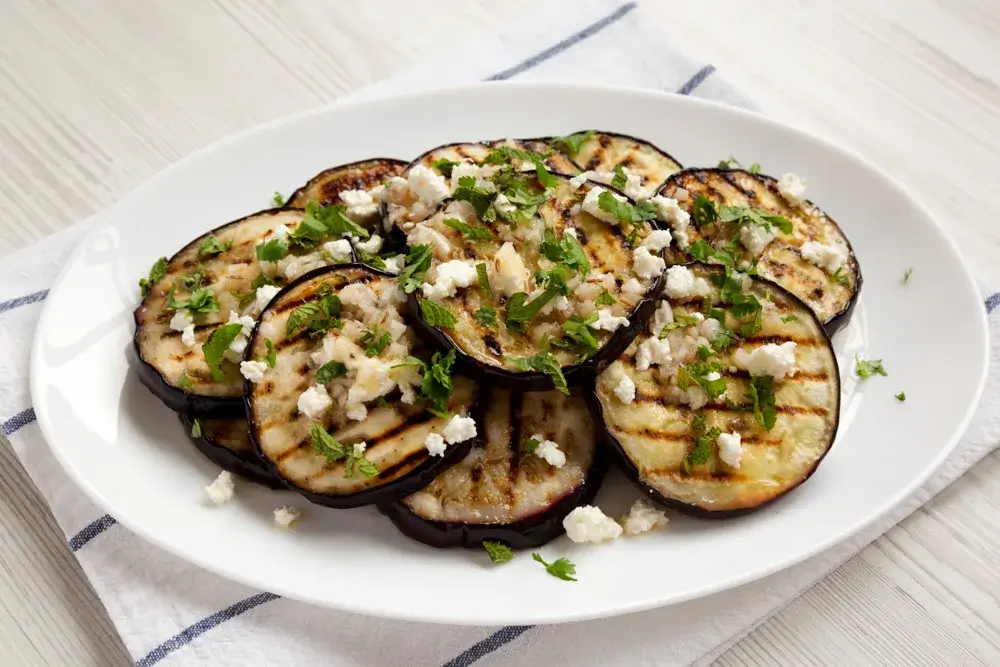
Are you ready to change your life for better health and a happier life? Or maybe you just want to change your relationship with what you eat and drink.
The Mediterranean diet can be that change.
The Mediterranean diet isn’t just another fad. It’s a lifestyle rooted in the time-tested traditions of Mediterranean countries like Greece, Italy, and Spain. This eating plan emphasizes savoring delicious, wholesome foods that not only taste amazing but also boost your health.
We are going to take a deep look at the Mediterranean diet and discover why it’s celebrated as one of the healthiest diets in the world.
So, are ready to go the Med way? Don’t worry. We are also going to provide a food list and actionable tips for beginners looking to get into the Mediterranean diet.
Remember, staying consistent on any diet is all about your ability to plan and stick to that plan. When meals are planned and organized in one place, it removes a lot of daily decision-making. I use this weekly meal planner spreadsheet to stay consistent week after week.
Get the Weekly Meal Planner Spreadsheet.
Weekly Meal Planner Spreadsheet with Automated Grocery List & Calorie Tracking
A simple all-in-one weekly meal planner spreadsheet to help you plan weekly meals, organize recipes, auto-generate grocery lists, and track calories and macros.
What is the Mediterranean Diet?
The Mediterranean diet is more than just a way of eating. It’s a heart-healthy lifestyle. This diet emphasizes fresh fruits, vegetables, whole grains, and healthy fats. Inspired by the dietary habits of Mediterranean countries, it incorporates foods that have stood the test of time. So, what makes this diet so special? It’s all about balance. You’ll enjoy a variety of foods that are not only nutritious but also incredibly satisfying.
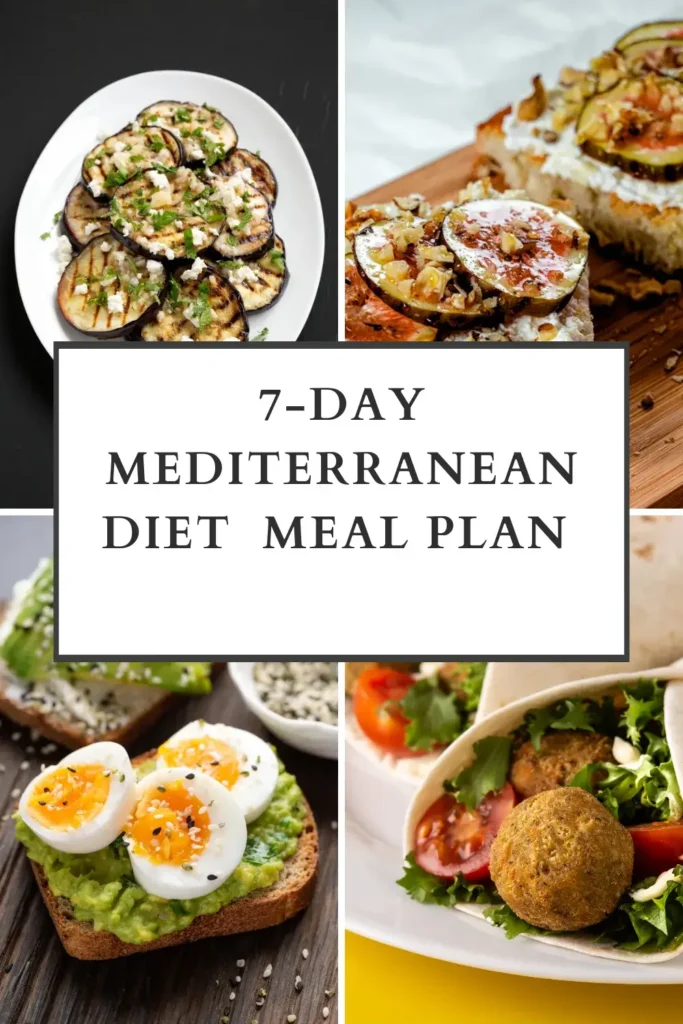
Health Benefits of the Mediterranean Diet
Why should you consider the Mediterranean diet if you are a beginner?
The health benefits are impressive. Studies show that this diet can significantly reduce the risk of heart disease, stroke, and certain cancers. It’s also linked to better mental health and a longer lifespan. Transitioning to this diet means you’re not just improving your body; you’re enhancing your overall well-being.
1. Reduced Risk of Heart Disease. The Mediterranean diet is rich in healthy fats, especially from olive oil, nuts, and fish. These fats help you lower bad cholesterol levels and increase good cholesterol. This, in turn, reduces the risk of heart disease.
2. Lowered Stroke Risk. By consuming plenty of fruits, vegetables, and whole grains, you get a high intake of fiber and antioxidants. These nutrients help you maintain healthy blood pressure levels and improve blood vessel function, which lowers stroke risk.
3. Cancer Prevention. The diet’s emphasis on fruits, vegetables, and healthy fats provides a ton of antioxidants and anti-inflammatory compounds. These can help you reduce the risk of certain cancers, particularly those of the digestive tract and breast.
4. Improved Mental Health. Omega-3 fatty acids found in fish are crucial for brain health. They help you reduce the risk of depression and cognitive decline, promoting better mental well-being.
5. Longevity. The Mediterranean diet encourages a balanced intake of essential nutrients, which contributes to overall health and longevity. People following this diet tend to live longer, healthier lives. Here are more ideas for exactly what to eat to increase not only your lifespan but also your healthspan.
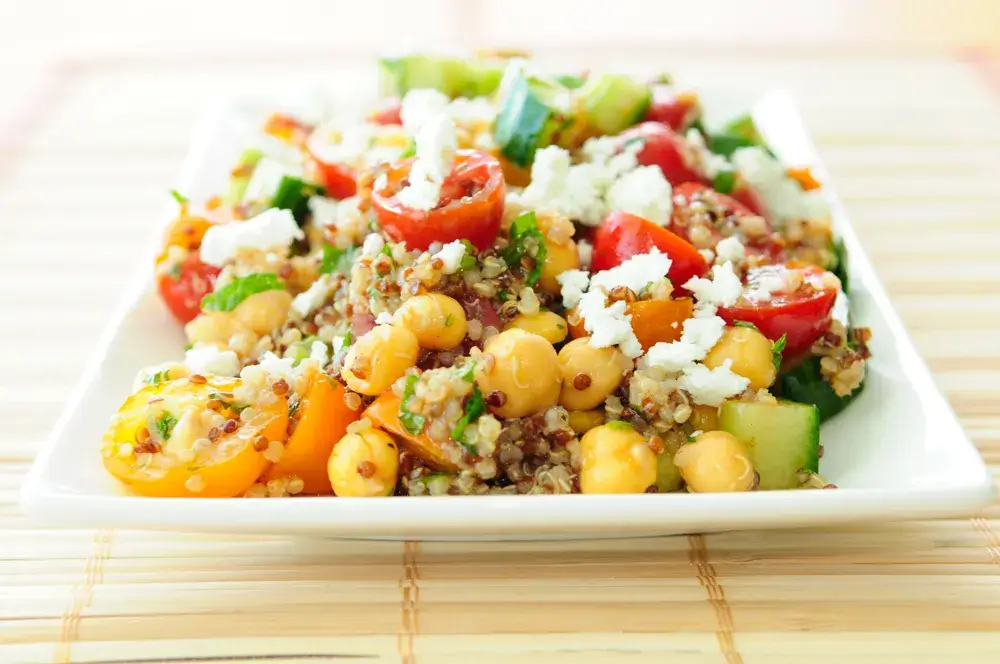
Why Choose the Mediterranean Diet?
Choosing the Mediterranean diet is a decision that goes beyond food. It’s about embracing a culture and lifestyle that promotes wellness and happiness.
If you want a diet that celebrates life, joy, and health, the Mediterranean diet is for you. It’s not just about what you eat. It’s about how you live.
1. Enjoy Delicious, Wholesome Foods. The Mediterranean diet is rich in flavors. From fresh herbs and spices to ripe fruits and vegetables, every meal is a culinary joy. Enjoying what you eat makes it easier to stick to a healthy eating plan.
2. Savor Meals with Loved Ones. Eating is a social activity in Mediterranean cultures. Meals are shared with family and friends, making the experience more enjoyable. This social aspect promotes emotional well-being and strengthens relationships.
3. Stay Active and Fit. The Mediterranean lifestyle emphasizes the importance of regular physical activity. Whether it’s walking, gardening, or dancing, staying active is a natural part of daily life. This helps maintain a healthy weight and boosts overall fitness.
4. Embrace a Balanced Lifestyle. The Mediterranean diet is not about strict rules. It’s about balance. You can enjoy a variety of foods in moderation, which makes it sustainable in the long run. This balanced approach to eating promotes long-term health and well-being.
5. Celebrate Life and Happiness. At its core, the Mediterranean diet is about celebrating life. It encourages you to slow down, enjoy your meals, and appreciate the simple pleasures. This mindful approach to eating enhances your overall quality of life.
Mediterranean Diet Basics
Now that you’re excited about the Mediterranean diet as a beginner looking to get into this diet, let’s break down the basics. What should you eat, and what should you avoid?
Here’s everything you need to know to get started.
Key Components of the Mediterranean Diet
Fruits and Vegetables: Aim for at least five servings a day. Fruit and Vegetables should be the cornerstone of your diet.
Whole Grains: Choose brown rice, whole wheat pasta, and oats. These provide essential nutrients and keep you feeling full.
Healthy Fats: Olive oil, nuts, and seeds should be a common aspect of your meals. They’re packed with healthy fats that support heart health. Check out this comprehensive list of all the healthy fats you should be eating in your Mediterranean diet.
Lean Proteins: Think fish, poultry, beans, and legumes. These proteins are not only lean but also rich in essential nutrients.
Dairy: Opt for low-fat or fat-free versions. They provide calcium and other vital nutrients without the extra fat.
Herbs and Spices: Use these to flavor your food instead of salt. They add depth and richness to your meals without the health risks associated with too much sodium.
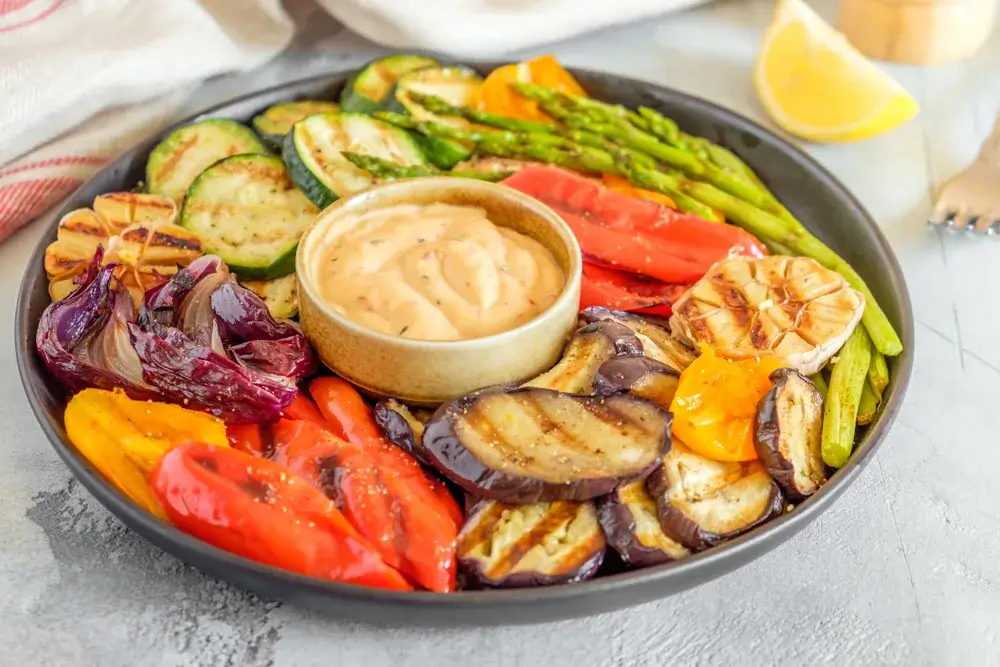
Foods to Eat
- Fresh Fruits and Vegetables: These should form the bulk of your meals. They’re full of vitamins, minerals, and fiber.
- Nuts and Seeds: Great for snacking and adding texture to dishes.
- Whole Grains: These include quinoa, barley, and bulgur. They’re filling and packed with nutrients.
- Fish and Seafood: Aim for at least two servings a week. They’re rich in omega-3 fatty acids, which are good for your heart.
- Extra Virgin Olive Oil: Use it for cooking and dressings. It’s a healthy fat that enhances the flavor of your food.
- Legumes: Beans, lentils, and chickpeas are excellent sources of protein and fiber.
- Herbs and Spices: Fresh or dried, they’re essential for flavor without adding extra calories.
Foods to Avoid
- Processed Foods: These often contain unhealthy fats, sugars, and additives.
- Refined Grains: White bread, pasta, and rice lack the nutrients found in whole grains.
- Sugary Beverages: Soda, energy drinks, and sweetened teas can add unnecessary calories and sugar.
- Excessive Red Meat: While you don’t have to eliminate it, you should reduce your intake. Opt for leaner meats like poultry and fish.
- High-Fat Dairy Products: Choose low-fat or fat-free versions to cut down on saturated fats.
How to Get Started on the Mediterranean Diet as a Beginner
Starting the Mediterranean diet for beginners might seem overwhelming at first. However, with the right pantry staples and a few simple tips, you’ll be well on your way to actually living this healthy lifestyle.
Let’s break it down step-by-step and get you started.
Pantry Staples
To get started, it’s essential to stock your pantry with Mediterranean diet essentials. This will make meal prep easier and ensure you always have healthy options on hand.
Here are the must-have items:
- Olive Oil: Extra virgin olive oil is a cornerstone of the Mediterranean diet. You can use it for cooking, dressings, and drizzling over dishes for those essential healthy fats.
- Whole Grains: Think brown rice, quinoa, whole wheat pasta, and oats. These provide a solid base for many meals and are packed with fiber.
- Beans and Legumes: Stock up on chickpeas, lentils, black beans, and white beans. They are versatile and rich in both protein and fiber.
- Nuts and Seeds: Almonds, walnuts, sunflower seeds, and chia seeds are great for snacking and adding texture to dishes.
- Herbs and Spices: Fresh and dried herbs like basil, oregano, lemon balm, rosemary, and spices like cumin and paprika will add flavor without extra calories.

Tips for Transitioning to the Mediterranean Diet as a Beginner
Transitioning to the Mediterranean diet as a beginner doesn’t have to be difficult.
Here are some actionable tips to make the shift smooth.
- Include More Fruits and Vegetables: Start by adding a serving of fruits or vegetables to every meal. For instance, you can have a piece of fruit with breakfast, a salad with lunch, and steamed veggies with dinner. Gradually increasing your intake will make it easier to adapt.
- Replace Red Meat with Fish or Poultry: Instead of red meat such as steak, opt for fish or poultry. Fish like salmon, sardines, and mackerel are rich in omega-3 fatty acids, which are great for heart health. Similarly, poultry is a leaner option that fits well within the diet’s guidelines.
- Use Olive Oil Instead of Butter: When cooking or preparing food, replace butter with olive oil. Olive oil is healthier and adds a rich flavor to dishes. You can drizzle it over salads, use it in marinades, or for sautéing vegetables.
- Make Small Changes Gradually: You don’t need to overhaul your entire diet overnight. Make small changes gradually. For instance, start by having one Mediterranean meal per day and then increase it as you become more comfortable.
- Experiment with Mediterranean Recipes: Try out new recipes that align with the Mediterranean diet. This will keep your meals interesting and enjoyable. Besides, experimenting with different flavors and ingredients can be a fun and rewarding experience.
Mediterranean Breakfast Ideas
Starting your day with a Mediterranean-inspired breakfast is a great way to set a healthy tone for the rest of you day. That is why we are providing a few delicious and easy recipes to get you started on the Mediterranean diet as a beginner.
Recipe 1: Greek Yogurt with Honey and Nuts
Ingredients:
- 1 cup Greek yogurt
- 1 tablespoon honey
- A handful of mixed nuts
Instructions:
- Place the yogurt in a bowl.
- Drizzle honey over the yogurt.
- Top with mixed nuts.
This breakfast is not only quick but also packed with protein and healthy fats to keep you full and energized.
Recipe 2: Avocado Toast with Tomatoes and Feta
Ingredients:
- 1 slice whole grain bread
- 1/2 avocado, preferably mashed
- 1/2 tomato, sliced
- 1 tablespoon feta cheese, crumbled
Instructions:
- Toast the bread.
- Spread the mashed avocado on the toast.
- Top with tomato slices and feta cheese.
Avocado toast is a trendy favorite for many that’s also incredibly nutritious. The combination of whole grains, healthy fats, and fresh vegetables makes it a perfect Mediterranean breakfast.
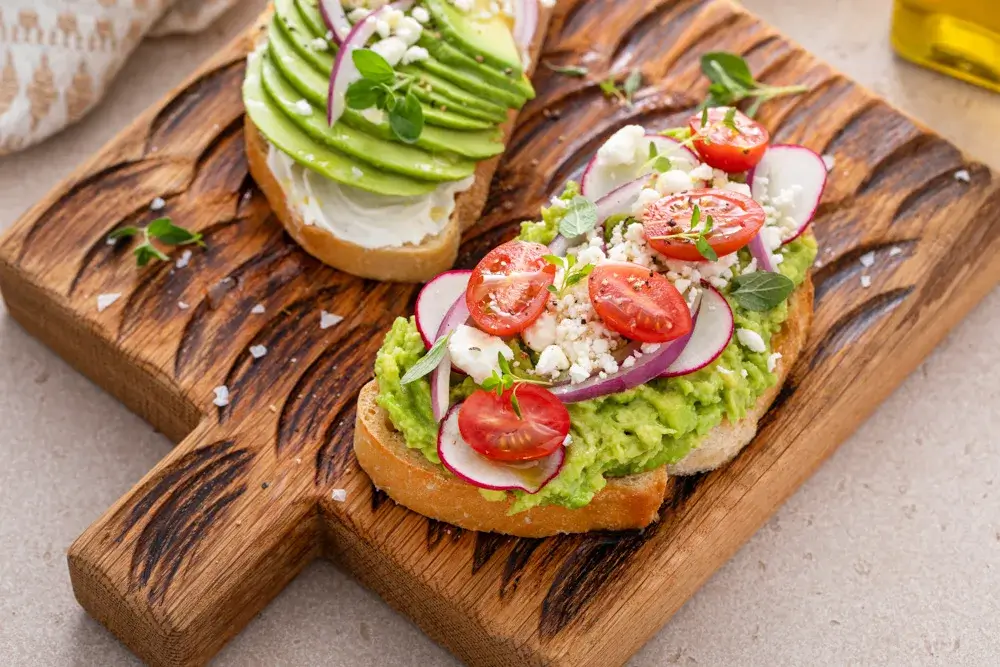
3. Recipe: Mediterranean Smoothie Bowl
Ingredients:
- 1 cup mixed berries
- 1 banana
- 1/2 cup Greek yogurt
- 1 tablespoon chia seeds
Instructions:
- Blend the berries, banana, and yogurt until smooth.
- Pour into a bowl.
- Sprinkle with chia seeds.
This smoothie is filled with antioxidants, fiber, and protein, making it a balanced and delicious breakfast option.
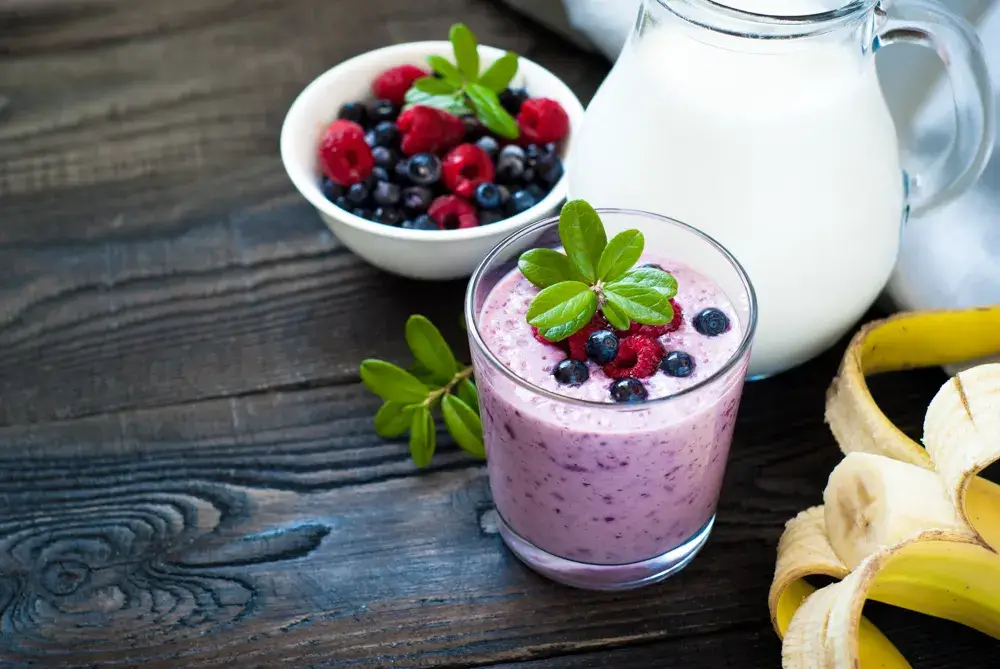
Mediterranean Diet Meal Plan
To help you get started on the Mediterranean Diet as a beginner, here is a one-week meal plan that is both delicious and easy to follow. Each day includes a balanced mix of meals that will keep you satisfied and energized.
If you don’t want to plan everything from scratch each week, I use a weekly meal planner spreadsheet that lets you organize your recipes, plan your weekly meals, build a grocery list automatically, and track calories and macros, if you want to, all in one place.
Weekly Meal Planner Spreadsheet with Automated Grocery List & Calorie Tracking
A simple all-in-one weekly meal planner spreadsheet to help you plan weekly meals, organize recipes, auto-generate grocery lists, and track calories and macros.
One-Week Mediterranean Diet Meal Plan
MONDAY:
- Breakfast: Greek Yogurt with Honey and Nuts
- This is a creamy and nutritious start to your day. Greek yogurt provides protein and probiotics, while honey adds natural sweetness. Nuts offer healthy fats and a satisfying crunch.
- Lunch: Quinoa Salad with Chickpeas and Veggies
- This is a protein-packed salad. Quinoa and chickpeas are excellent sources of plant-based protein, combined with a variety of fresh veggies for fiber and vitamins.
- Dinner: Grilled Salmon with Steamed Vegetables
- A heart-healthy meal rich in omega-3 fatty acids from the salmon, paired with a mix of steamed seasonal vegetables.
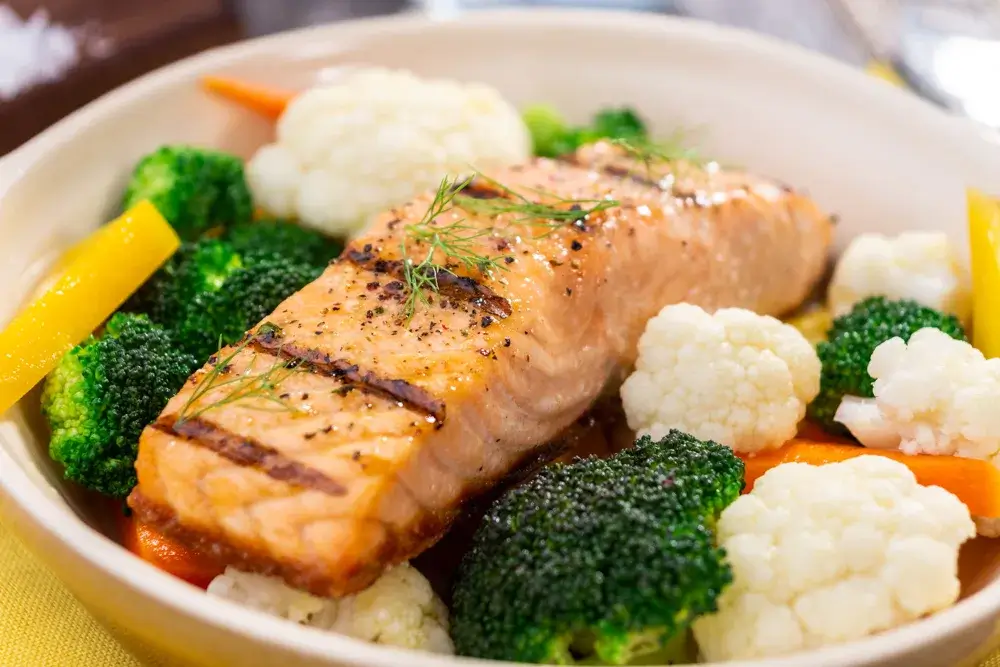
TUESDAY:
- Breakfast: Avocado Toast with Tomatoes and Feta
- Whole grain toast topped with creamy avocado, juicy tomatoes, and tangy feta cheese. This combination is both tasty and nutritious.
- Lunch: Hummus and Veggie Wrap
- A wrap filled with homemade hummus and a variety of fresh, crunchy vegetables. It’s a perfect portable lunch.
- Dinner: Baked Chicken with Rosemary and Potatoes
- Juicy baked chicken breasts seasoned with rosemary, served alongside roasted potatoes. A comforting and satisfying dinner.
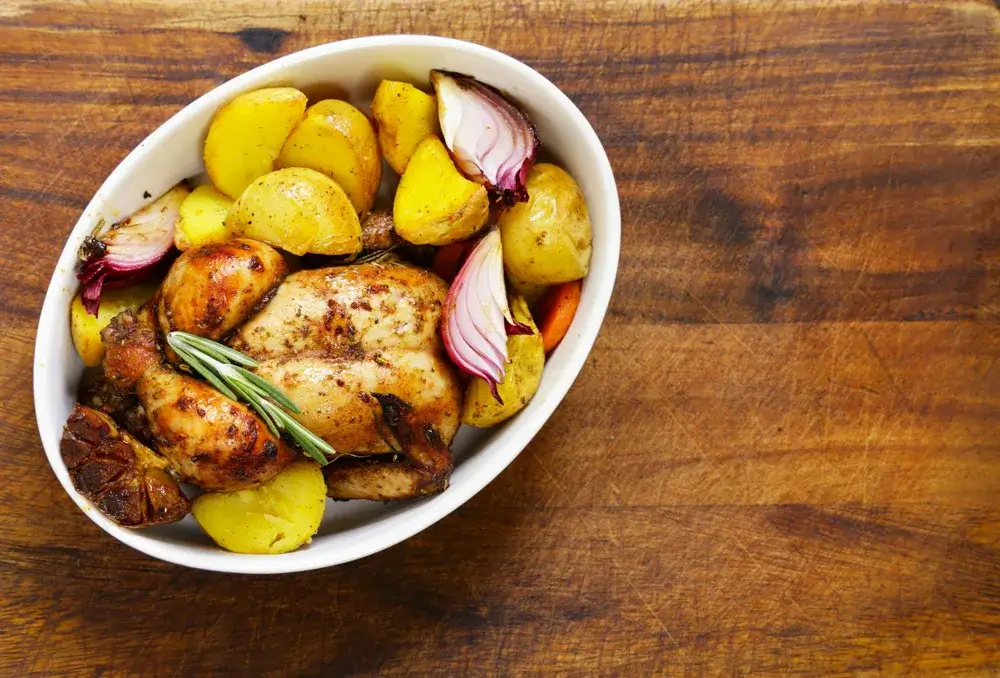
WEDNESDAY:
- Breakfast: Mediterranean Smoothie Bowl
- A bowl filled with blended mixed berries, banana, and Greek yogurt, topped with chia seeds for added fiber and omega-3s.
- Lunch: Lentil Soup with a Side Salad
- Lentil soup packed with protein and fiber, served with a fresh side salad for added greens.
- Dinner: Shrimp Sautéed with Garlic and Spinach
- Tender shrimp cooked with garlic and fresh spinach. This dish is quick to prepare and full of flavor.
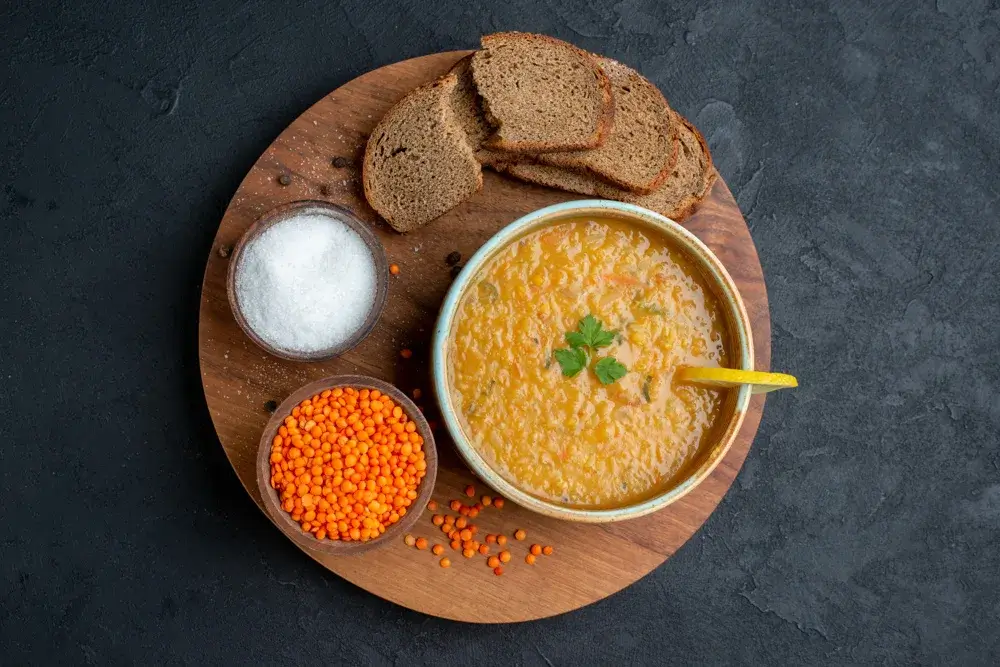
THURSDAY:
- Breakfast: Whole Grain Oatmeal with Fresh Berries
- Oatmeal topped with fresh, antioxidant-rich berries. A perfect breakfast for the Mediterranean diet.
- Lunch: Greek Salad with Grilled Chicken
- A classic Greek salad with tomatoes, cucumbers, olives, and feta, topped with grilled chicken for added protein.
- Dinner: Stuffed Bell Peppers with Quinoa and Veggies
- Bell peppers stuffed with a mix of quinoa and vegetables. A delicious and nutritious dinner option.
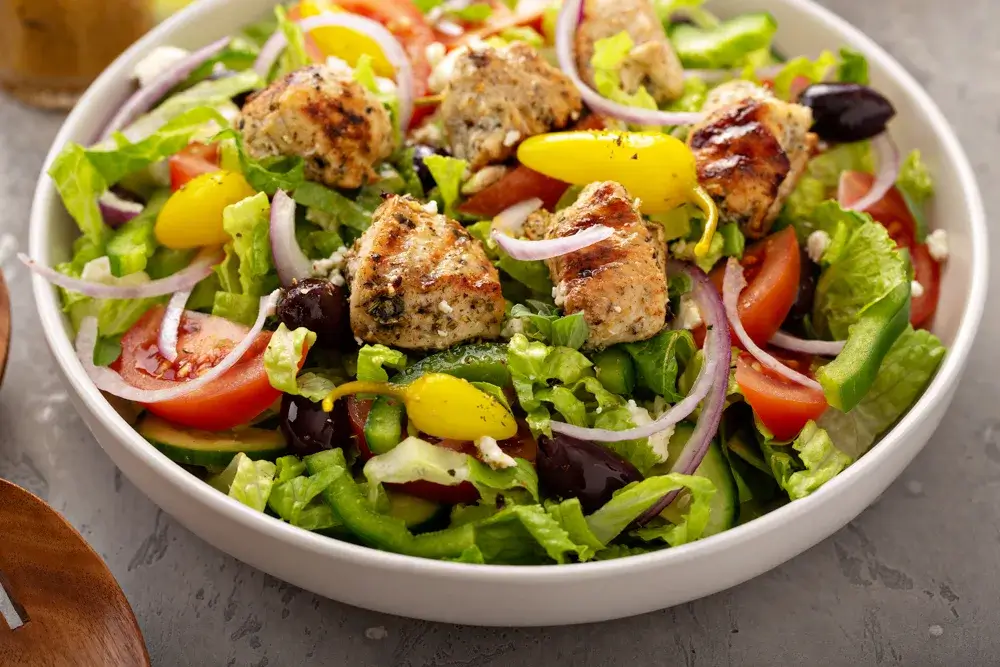
FRIDAY:
- Breakfast: Ricotta and Fig Toast
- Whole grain toast spread with creamy ricotta cheese and topped with sweet figs. Aunique breakfast.
- Lunch: Falafel Wrap with Tzatziki
- A wrap filled with homemade falafel, fresh veggies, and creamy tzatziki sauce. It’s both filling and flavorful.
- Dinner: Grilled Eggplant with Feta and Herbs
- Slices of grilled eggplant topped with crumbled feta and fresh herbs. A simple yet satisfying vegetarian dinner.

SATURDAY:
- Breakfast: Spinach and Feta Omelet
- A protein-packed omelet filled with fresh spinach and tangy feta cheese. A great way to start your day with greens.
- Lunch: Tuna Salad with Olive Oil Dressing
- A fresh tuna salad made with a light olive oil dressing. Perfect for a light but satisfying lunch.
- Dinner: Whole Wheat Pasta with Tomato and Basil Sauce
- Whole wheat pasta tossed in a homemade tomato and basil sauce. A classic Mediterranean dish that’s always a favorite.
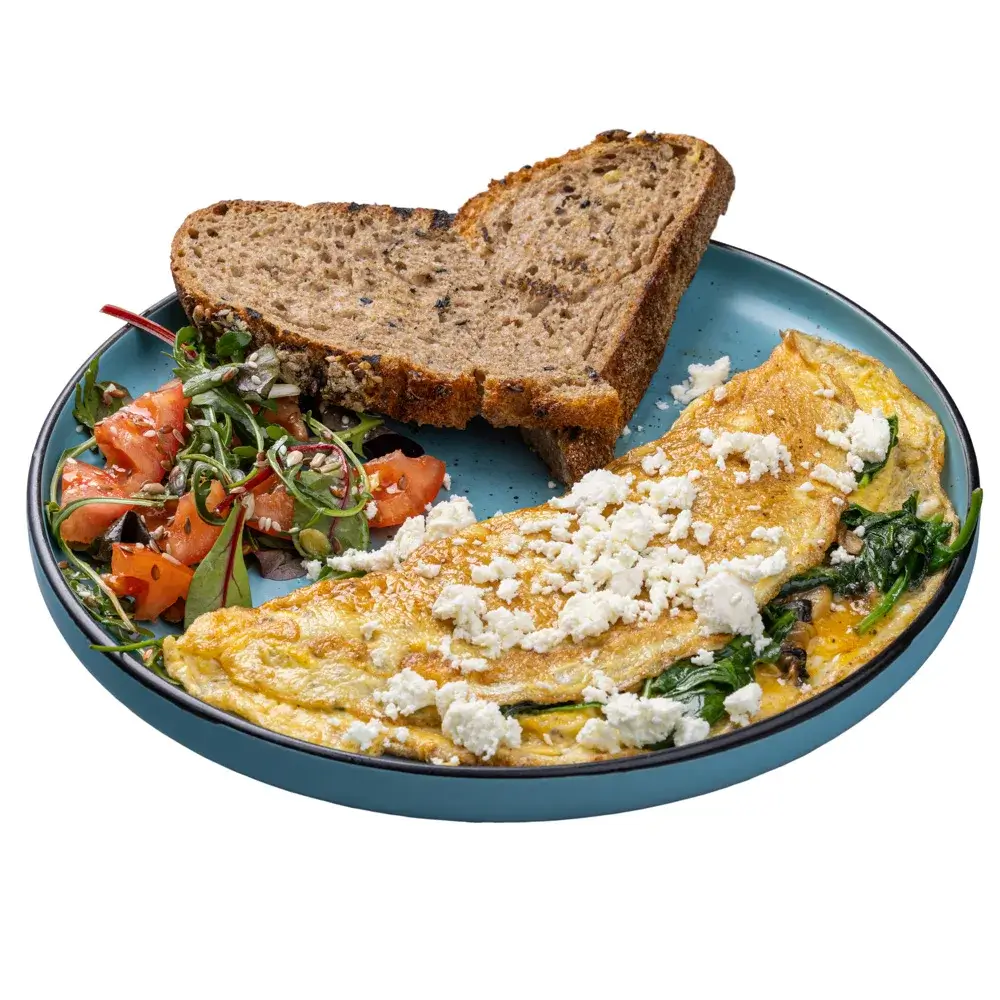
Day 7:
- Breakfast: Cottage Cheese with Fresh Fruit
- Creamy cottage cheese paired with a variety of fresh fruits. It’s a balanced and interesting breakfast.
- Lunch: Caprese Salad with Whole Grain Bread
- A simple Caprese salad with tomatoes, mozzarella, and basil, served with whole grain bread. This meal is light and delicious.
- Dinner: Roasted Vegetable Platter with Hummus
- An assortment of roasted vegetables served with creamy hummus.

Tips for Success
Sticking to the Mediterranean diet as a beginner can be straightforward and enjoyable with a few helpful tips. Here’s how to stay on track and make the most of this healthy lifestyle.
How to Stay on Track
- Plan Your Meals Ahead of Time: Meal planning is essential. Spend some time each weekend planning your meals. This helps ensure you have all the ingredients you need and can prevent last-minute unhealthy choices.
- Keep Healthy Snacks on Hand: Stock up on nuts, fresh fruits, and yogurt for quick and healthy snacks. Having these options readily available can help you avoid reaching for processed snacks.
- Enjoy Your Food: Take time to savor your meals. Eating slowly and mindfully can enhance your enjoyment and help you recognize when you’re full.
- Be Mindful of Portion Sizes: Even healthy foods can contribute to weight gain if consumed in large quantities. So pay attention to portion sizes to maintain a balanced diet.
Common Issues and How to Avoid Them
- Avoiding Processed Foods: Processed foods are often high in unhealthy fats, sugars, and additives. Focus on whole, natural foods as much as possible to stay true to the Mediterranean diet.
- Watching Portions: It’s easy to overeat even healthy foods. Be mindful of your portions and try to stick to appropriate serving sizes to avoid excess calorie intake.

Conclusion
In conclusion, embarking on the Mediterranean diet as a beginner is a journey toward a healthier, happier you.
So what’s the way forward?
With these delicious Mediterranean breakfast recipes, a solid meal plan, and practical tips, you’re well on your way to embracing this lifestyle.
Remember, it’s not just a diet. It’s a way of living that celebrates good food, good health, and good company.
Get our weekly meal planner spreadsheet to help you stay consistent.
Weekly Meal Planner Spreadsheet with Automated Grocery List & Calorie Tracking
A simple all-in-one weekly meal planner spreadsheet to help you plan weekly meals, organize recipes, auto-generate grocery lists, and track calories and macros.
FAQ
Can You Lose Weight on the Mediterranean Diet?
Yes! The Mediterranean diet can help with weight loss when combined with physical activity and portion control. The diet emphasizes whole foods and balanced meals, which can naturally reduce calorie intake and promote a healthy weight.
Is the Mediterranean Diet Suitable for Vegetarians?
Absolutely. The Mediterranean diet is a plant-based and focused eating plan, making it easy to follow as a vegetarian. If you focus on the abundant fruits, vegetables, grains, and legumes available. You can still enjoy a wide variety of delicious and nutritious meals.
How do you Adjust the Mediterranean Diet for Different Lifestyles?
If you’re active, you might need more protein and carbs. Adjust portions to match your energy needs. If you have dietary restrictions, focus on the wide variety of foods available and find suitable substitutes. For example, gluten-free grains like quinoa and rice can replace wheat-based options.


